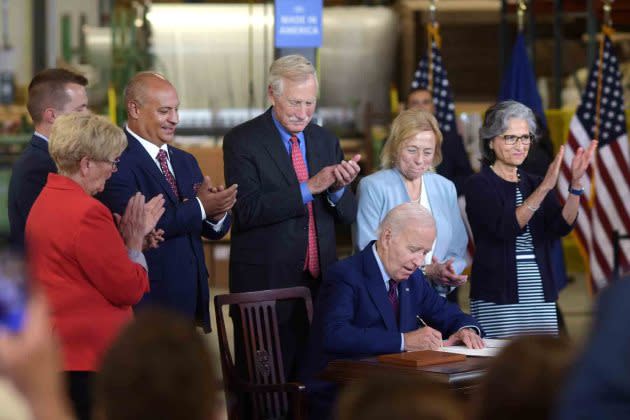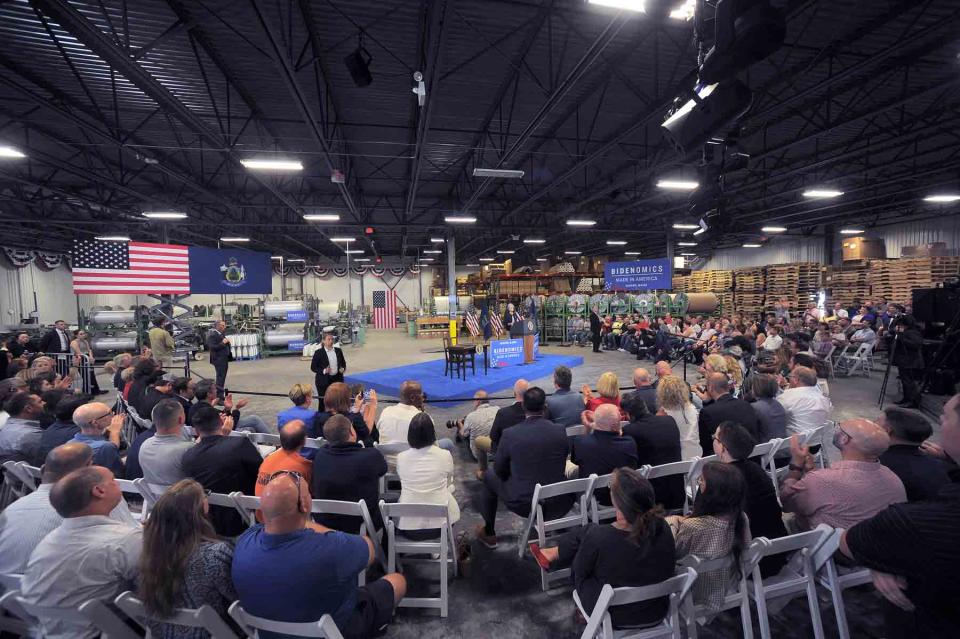AMI CEO Talks President Biden’s Visit, China Trade Dispute and Domestic Manufacturing

As is often the case, the anticipation of company prompts an in-house purge. That scenario played out at Auburn Manufacturing Inc., which had seven days advance notice that it would host President Joe Biden on Friday in one of its Maine factories.
Chief executive officer Kathie Leonard was still coming down from the whirlwind Tuesday morning. Three truckloads of inventory, equipment, packaging materials and other items were temporarily hauled away to set up a podium and seating or the event in the company’s 50,000-square-foot facility in Auburn. Biden used the occasion to sign the executive order “Invent it here, make it here“ initiative, asking agencies to consider U.S. national security and economic interests in relation to domestic manufacturing.
More from WWD
Exploring a New Vision of Design: WWD China Joins Hands for Shanghai Gala
Études Expands in China With New Stores in Shenzhen and Beijing
Kenzo Presents First China Show Along Shanghai's Huangpu River
Founded in 1979, AMI is a 100 percent domestic manufacturer of heat-resistant fabrics for the industrial sector with 55 employees. The company makes fabrics that are used in outer jackets and gloves that are used to handle extremely hot substances. Although AMI had not previously dealt with the Biden administration in any capacity, Maine’s two senators and two congressmen know Leonard well due partially to AMI’s anti-dumping case against China. AMI does, however, sell to the U.S. Defense Department, including the U.S. Navy and defense contractors.
“Surprised” as she was to have been selected as the host — due to being “an example of a small manufacturer who has survived,” Leonard said, “I’ve made it clear all these years that we stayed American. We don’t make anything outside of the country.”
In 2017, AMI started a trade dispute with Chinese competitors after its domestic orders decreased due to Chinese products being sold through U.S. distributors. Federal authorities determined that the Chinese government was subsidizing the competitors and producing goods in state-owned factories. More recently in February, the U.S. Department of Commerce ruled in favor of AMI, deciding that China’s avoidance of anti-dumping and countervailing duty orders constituted unfair trade practices. “They should have been paying a 300 percent duty, which is what we won. The only reason the end user was buying from them was because they were cheap,” Leonard said.
We’re all so worried, biting our nails and asking, ‘Oh gosh, what’s that going to cost?’ That wasn’t covered by the government.”
Kathie Leonard, CEO of Auburn Manufacturing Inc.
A similar scenario is playing out with Shein and Temu shipments to the U.S., due to the de minimis value, which exempts the payment of a duty for shipped goods that do not exceed $800. “Absolutely, that’s something that the National Council of Textile Organizations has been very vocal about in Washington. It sounds like it’s getting some attention finally,” Leonard said.
As it turned out, Leonard “didn’t get to discuss much” with Biden during the 90-minute appearance. “If anything, I would have urged him to continue the 301 tariffs that were put on during the Trump administration [in 2018]. There’s some talk that they might lift those [on $300 billion worth of imports from China]. For our types of products, that would be a 25 percent tariff. That’s a drop in the bucket to China. They can absorb that in no time,” she said, adding that the Chinese government subsidizes similarly made yarns.
Leonard said she also wanted “to honor” how Biden’s policies have leaned toward American made. “Maybe not as much [in relation to] textiles, but in general we’re reshoring companies. When you reshore steel, for example, our products go into those industries so that creates business for the textiles,” she said.
In addition, through the $1.9 trillion American Rescue Plan Act, AMI secured a grant for innovation. “We’ve been on our backs, since the dumping case, which cost us almost $1 million. We were digging out of that, finally getting our customers back and then we were hit with COVID-19. You had customers holding their orders that were already orders in-house. They didn’t want to release them because they didn’t know if they would be operating. All of that took some time and really took a lot out of American manufacturing,” Leonard said.
Declining to comment on annual sales, Leonard said business is 30 percent ahead of last year, and 2022 sales were 25 percent higher than 2021 sales. Having recently reviewed a 2012 strategic plan, she said AMI should have been where it is now financially by 2017, had it not become entangled in the anti-dumping China trade dispute. “I’m just so glad that government is expressing a newfound love for American manufacturing. How many years did we have this ‘we’re-free-traders, we’re-free-traders’ instead of we’re fair-traders?” Leonard said. “Almost every politician that I ran into liked to say that. And at our expense. I got to the point where I had to spell manufacturing to people, because it is in our company’s name.”
As for U.S.-based companies that produce overseas, Leonard said they “have to rethink what the American consumer wants.” Singling out the success of American Giant and Los Angeles-based jeans companies, she said, “Americans are excited about buying American-made products and they will pay more for them if the value is there.”
The country’s inability to get domestically made PPE goods for health care workers at the onset of the pandemic was “just so sad,” Leonard said. Acknowledging the limited amount of U.S.-made attire for health care workers, she suggested companies sell directly to hospitals versus through distributors to make domestic production more affordable. “It might not be the volume that they were years ago before they went offshore, but you can start looking at it that way. Look at how many consumer products are being sold directly through radio and TV advertising. They don’t need distributors to do that. Use technology to get to the end user.”
Leonard also questioned whether apparel manufacturers have to rely on buyers, suggesting more of the direct-to-consumer model or focusing more on boutiques to find niches. Recognizing that many apparel brands are direct-to-consumer but produce overseas, Leonard said, “That’s one of those deals, where the label reads, ‘Designed in New York and Made in China.’ That’s a problem.”
Speculating that the cost-cutting argument of offshore manufacturing may change, Leonard noted freight expenses, shipping-related environmental concerns and extended turnaround times. “There’s opportunity here for companies to start looking at,” she said.

Dealing with the 50-person influx of Secret Service, White House staff and communications teams, Leonard said, “Each of those have their own agendas. You might be told to do one thing from one group and another thing from another group. I had a hard time with that because this is my business. This is my plant. It’s like, ‘Hey, you’re telling me I can’t do this? I’ve been doing this for 43 years [laughs],’” adding that a 75-person crew of locals handled the advance build-out. “They were very nice, but they are under a time pressure to get this stuff done. I understand that we’re a small town in Maine and we’re used to doing it our way and a little slower, but we revved it up and got it done.”
Installing two huge air conditioning units and generators to run them in the Auburn facility was a first. “Someone had to drive to New Jersey to get them. They look like what you would see if you got a bad room on the top-floor of a hotel. We don’t air condition our manufacturing area. We have a very short summer here,” Leonard said. “I don’t know what the gas bill will be for that. It runs on petroleum. We’re all so worried, biting our nails and asking, ‘Oh gosh, what’s that going to cost?’ That wasn’t covered by the government.”
From a thumbnail perspective, AMI checks all the boxes — a small town-based domestic-made business that is woman-owned with an extreme heat focus that seems script-written given this summer’s rolling heat waves. “Oh yeah — you name it. We’re the poster child of the season. That’s OK. I don’t mind. We didn’t have anything to hide. We did it and I’m proud of it. If we can help other textile companies, that’s great too.”
The AMI CEO hasn’t had a chance to read the executive order, but she plans to. After rounding up AMI employees following Friday’s event for drinks on the deck of her nearby home, Leonard started Saturday with a yoga class, before going out to breakfast and to buy groceries. “Sunday I went for a long bike ride. I feel so much better; I finally started feeling human again,” Leonard said.
Best of WWD


